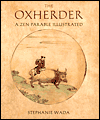
Ox Herder: A Zen Parable Illustrated
by Stephanie Wada, Gen P. Sakamoto, Kuoan Shi Niu Tu Song
Publisher: George Braziller Publishers (ISBN #: 0807615110, Hardcover, 85pp, January 2002)
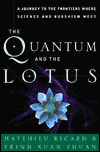
The Quantum and the Lotus: A Journey to the Frontiers Where Science and Buddhism Meet
by Matthieu Ricard, Trinh Xuan Thuan
Publisher: Crown Publishing Group (ISBN #: 0609608541, Hardcover, 320 pp, December 2001)
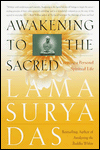
Awakening to the Sacred: Creating a Spiritual Life from Scratch
by Lama Surya Das
Publisher: Broadway Books (ISBN #: 0767902750, Paperback, 400 pp, May 2000)
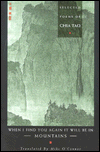
Poetry: When I Find You Again, It Will Be in the Mountains: The Selected Poems of Chia Tao
by Chia Tao; Mike O'Connor (translator)
Publisher: Wisdom Publications (ISBN #: 0861711726, Paperback, 224pp, November 1999)
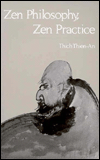
Zen Philosophy, Zen Practice
by Thich Thien An
Publisher: Dharma Publishing (ISBN #: 091354633X, Paperback, 192 pp, November 1989)
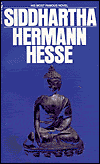
Siddhartha
by Hermann Hesse
Publisher: Bantam (ISBN #: 0553208845, Paperback, 160pp, December 1981)
|
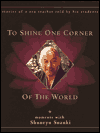 by Students of Shunryu Suzuki, David Chadwick (Editor)
by Students of Shunryu Suzuki, David Chadwick (Editor)
Publisher: Broadway Books (ISBN #: 0767906519, Hardcover, 144pp, March 2001)
» BUY THIS BOOK
» Submit a review

ZENGUIDE.COM REVIEW - Rating: 3/5
In his "Introduction", the editor of the book, David Chadwick said, "Suzuki's main teaching was silent -- the way he picked up a cup of tea or met someone walking on a path or in a hallway, or how he joined with his students in work, meals, and meditation. But when the occasion arose to speak, he made an impression. This book is a record of such impressions,..." (p. XI) And following are some moments from the record in random: * One morning when were all sitting zazen, Suzuki Roshi gave a brief impromptu talk in which he said, "Each of you is perfect the way you are... and you can use a little improvement."
Comment: It is the Buddha's view of human beings, isn't it? * One day at Tassajara Suzuki Roshi and a group of students took some tools and walked up a hot, dusty trail to work on a project. When they got to the top, they discovered that they had forgotten a shovel, and the student began a discussion about who should return to get it. After the discussion had ended, they realized that Roshi wasn't there. He was already halfway down the mountain trail, on his way to pick up the shovel."
Comment: Yes. What use for was that discussion? Who is Pai-chang Huai-hai? * One day I complained to Suzuki Roshi about the people I was working with. He listened intently. Finally, he said, "If you want to see virtue, you have to have a calm mind."
Comment: How do we have a calm mind? * Someone at a lecture asked Suzuki Roshi about psychoanalysis. In answer, he said, "You think the mind is like a pond that throw things in, and they sink into the bottom, like old shoes, and later they rise to the surface. But actually, there's no such thing as the mind!"
Comment: So, what does one's mind look like and where is it?
* Suzuki Roshi usually encouraged me, because I was so down on myself, but once after a one-day sitting, for the first time, I was feeling proud of myself. I went to him and said,"Now I can count every breath. What do I do next?" He leaned forward and said to me fiercely, Don't ever think that you can sit zazen! That's a big mistake! Zazen sits zazen!"
Comment: It's true. There is no one in sitting zazen. * One morning in the zendo as we were all silently sitting zazen, Susuki Roshi said, "Don't move. Just die over and over. Don't anticipate. Nothing can save you, because this is your last moment. Not even enlightenment will help you now, because you have no other moments. With no future, be true to yourself - and don't move.
Comment: If you really could die once in your life, then you never die again. * In the old days, during sesshin, Suzuki Roshi would encourage us to not change positions while sitting. He would say, "Don't move. Don't be chicken out." But he also said, "when I say don't move, it doesn't mean you can't move."
Comment: 'Move' or 'Don't move' has nothing to do with it.
* Suzuki Roshi's answer to my "What is enlightenment?" was to laugh and say, "You see? It's the monkey mind! Trying to understand enlightenment with the monkey mind!"
Comment: However, without the monkey mind, no one could know how to start awakening himself. But watch it! * A psychologist asked about the nature of enlightenment. "I am not enlightened, Suzuki Roshi said. "I can't answer."
Comment: Never dream of it! Right here, if you'd say something about it, two horns would grow on your head. * In dokusan a student repeated something that Suzuki Roshi had said in a lecture. Suzuki shook his head. "No?" the student asked, "but you said..." "When I said it, it was true," Suzuki answered. "When you said it, it was false."
Comment: What did you say, Roshi? Why is that only you right and me wrong? It's really unfair! With the above "moments" quoted with my brief comments to each of them, I think it's enough for now and if you, a zazen practitioner, like more than those, you have to have the book with you. However, do not dream that if you get the book in hand and read them all, you will get your dream. Any book on zen practice like this one, we can not talk too much about it like I already did.Chon Tri
SUBMIT YOUR BOOK FOR REVIEW
If you would like to have your book reviewed by Zen Guide, please send a copy of your book to:
Chon Tri - Book Review
1328 Peachtree Court
Frederick, MD 21703
USA
|















 BUDDHA : STATUE & FIGURINE COLLECTION
BUDDHA : STATUE & FIGURINE COLLECTION






